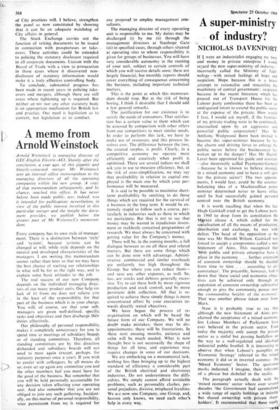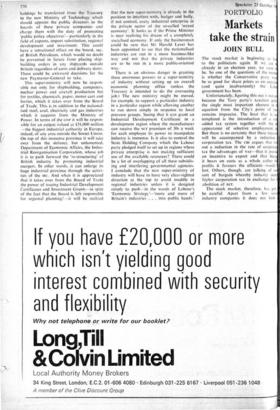A super-ministry of industry?
NICHOLAS DAVENPORT
If I were an industrialist engaging my time and money in private enterprise I would retard the new super-ministry of industry incorrectly called the Ministry of Tech- nology—with mixed feelings of hope and suspicion. Hope because this is a brave attempt to rationalise and streamline the machinery of central government : suspicion because in the recent literature which has poured out of Transport House for the Labour party conference there has been an undisguised intent to extend the public sector at the expense of the private. How would I fare, I would ask myself, if the frontiers of my private trading were to be continualh encroached upon by an aggressive and powerful public corporation? Has Mr Anthony Wedgwood Benn been invited to become this super-minister because he has the charm and driving force to enlarge the public sector before the businessman has woken up to the danger? Has Mr Harold Lever been appointed his guide and assistant —also incorrectly called Paymaster-General —because he is known to believe strongly in a mixed economy and to have a soft spot for the private sector? The two appoint- ments, I would fear, could be the counter- balancing idea of a Machiavellian prime minister determined never to leave office until he had successfully gained personal control over the British economy.
It is worth recalling that when the late Hugh Gaitskell tried to get the Labour party in 1960 to drop from its constitution the Mtrxist clause 4, which called for the socialisation of all the means of production,4 distribution and exchange, he met with - defeat. The head of the opposition at the time was Mr Harold Wilson. Gaitskell was forced to accept a compromise called a new StEttement of Aims. This recognised that 41:10411 public and private enterprise have a place in the economy . . . further extension of common ownership should be decided from time to time . . . according to cir- cumstances'. The preamble, however, laid it down that 'these social and economic objec- tives can be achieved only through an expansion of common ownership substantial enough to give the community power over the commanding heights of the economy'. That was another phrase taken over from Marx.
Now it is probably true to say that although the new Statement of Aims pro- claimed the acceptance of a mixed economy few Labour Members of Parliament have ever believed in the private sector. Even today the majority only accept the private sector as a sinful but passing bedfellow on the way to a well-regulated and idealised industrial public brothel. It is interesting to obServe that when Labour's pamphlet on 'Economic Strategy' referred to the mixed economy it did so in inverted commas—the `1140.xed Economy' Sector. The quotation marks indicated, I imagine, their tolerance of a phrase but disbelief in the reality.
The paragraph actually dealt with the 'mixed economy' sector where over several! decades 'the Government had accumulatedl a wide range of equity holdings in industry but shared ownership with private share- holders'. It recommended that these equity j
holdings be transferred from the Treasury to the new Ministry of Technology which should appoint the public directors to the boards of these private companies and charge them with the duty of promoting 'public policy objectives'—particularly in the field of exports, import substitution, regional development and investment. This could have a sensational effect on the board, say, of British Petroleum, which would no doubt be prevented in future from placing ship- building orders in any shipyards outside Britain regardless of costs and delivery dates. These could be awkward decisions for the new Paymaster-General to take.
This super-ministry will now be respon- sible not only for shipbuilding, computers, nuclear power and aircraft production but for textiles, chemicals, paper, motor car* and lorries, which it takes over from the Board of Trade. This is in addition to the national- ised steel, coal, electricity and gas industries which it acquires from the Ministry of Power. In terms of the GNP it will be respon- sible for an output valued at £31,000 million —the biggest industrial authority in Europe, indeed, of any area outside the Soviet Union. On top of this immense province it will take over from the defunct, but unlamented, Department of Economic Affairs, the Indus- trial Reorganisation Corporation, whose job it is to push forward the `re-structuring' of British industry by promoting industrial mergers. In other words, it can enlarge its huge industrial province through the activi- ties of the IRC. And when it is appreciated that it takes over from the Board of Trade the power of issuing Industrial Development Certificates and Investment Grants—in spite of the fact that the Board is left responsible for regional planning!—it will be realised that the new super-ministry is already in the position to interfere with, badger and bully, if not control, every industrial enterprise in the private sector of the so-called 'mixed economy'. It looks as if the Prime Minister is near realising his dream of a completely socialised economy. If only the businessman could be sure that Mr Harold Lever has been appointed to see that the nationalised industries are run in a more business-like way and not that the private industries are to be run in a more public-oriented way.
There is an obvious danger in granting these enormous powers to a super-ministry of industry without setting up an overall economic planning office (unless the Treasury is intended to do the overseeing job.) The new ministry might be moved, for example, to support a particular industry in a particular region while allowing another to run down simply in response to local pressure groups. Seeing that it can grant an Industrial Development Certificate in a development region where the manufacturer can receive the SET premium of 30s a week for each employee its power to manipulate industry is immense. Is it also to control the State Holding Company which the Labour party pledged itself to set up in regions where private enterprise is not making sufficient use of the available resources? There could be a lot of overlapping of all these subsidis- ing and interfering governmental agencies. I conclude that the new super-ministry of industry will have to have very clear-sighted direction at the top to avoid muddle in regional industries unless it is designed simply to push—in the words of Labour's 'Economic Strategy'—`more and more of Britain's industries . . . into public hands.'



















































 Previous page
Previous page